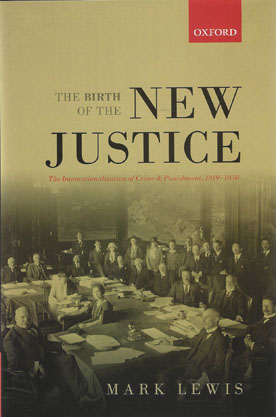
The Birth of the New Justice is a history of the attempts to instate ad hoc and permanent international criminal courts and new international criminal laws from the end of World War I to the beginning of the Cold War.
The purpose of these courts was to repress aggressive war, war crimes, terrorism, and genocide. Rather than arguing that these legal projects were attempts by state governments to project a "liberal legalism" and create an international state system that limited sovereignty, Mark Lewis shows that European jurists in a variety of transnational organizations derived their motives from a range of ideological motives - liberal, conservative, utopian, humanitarian, nationalist, and particularist.
European jurists at the Paris Peace Conference in 1919 created a controversial new philosophy of prosecution and punishment, and during the following decades, jurists in different organizations, including the International Law Association, International Association for Criminal Law, the World Jewish Congress, and the International Committee of the Red Cross, transformed the ideas of the legitimacy of post-war trials and the concept of international crime to deal with myriad social and political problems.
The concept of an international criminal court was never static, and the idea that national tribunals would form an integral part of an international system to enforce new laws was frequently advanced as a pragmatic-and politically convenient-solution.
The Birth of the New Justice shows that legal organizations were not merely interested in ensuring that the guilty were punished or that international peace was assured. They hoped to instil particular moral values, represent the interests of certain social groups, and even pursue national agendas.
At the same time, their projects to define new types of crimes and ensure that old ones were truly punished also sprang from hopes that a new international political and moral order would check the power of the sovereign nation-state. When jurists had to scale back their projects, it was not only because state governments opposed them; it was also because they lacked political connections, did not build public support for their ideas, or decided that compromises were better than nothing.